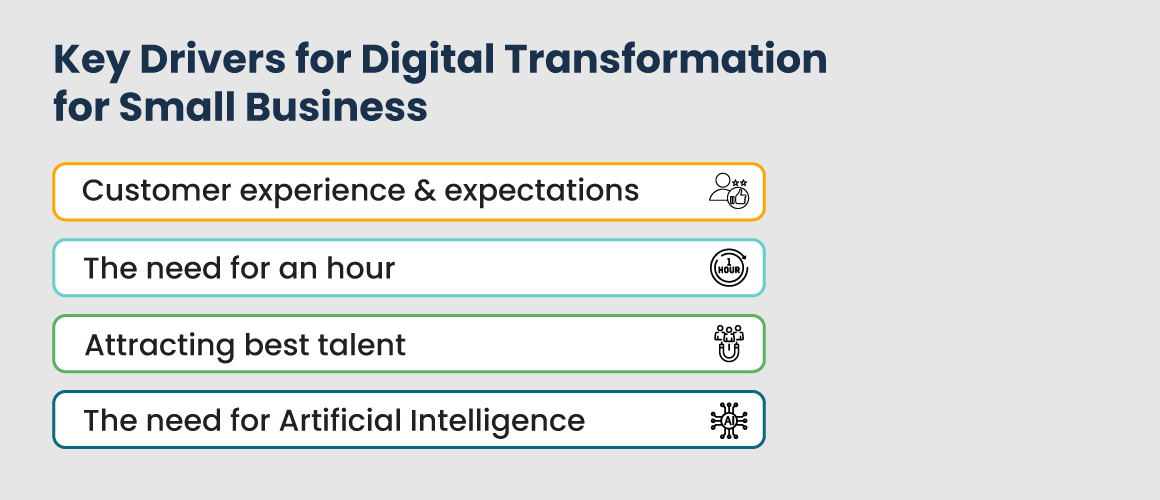Table Of Content
- What is Digital Transformation
- The Importance of digital transformation for small businesses
- Why digital transformation is essential for business growth
- Digital Transformation Process for Small Businesses
- Survive and Thrive In This Age of Digital Disruption
- Key Drivers for digital transformation for small business
- Conclusion: Why You Should Invest in Your Business’ Digital Transformation Today
To remain relevant and competitive in today’s environment, digital transformation for small business is imperative. But it can sound like a daunting task for a small business with a tight budget. However, you simply cannot ignore the advantages of implementing the appropriate technologies in your company.
You’ll be able to increase productivity, decrease expenses, enhance customer satisfaction, improve efficiency, and eventually raise profits. A deeper understanding of digital transformation will help you maximize your investment, whether you’re just getting underway or want to adjust your digital transformation approach.
What is Digital Transformation
Digital transformation is more than integrating a few digital tools into your existing workflows. That being said, the use of digital technology to develop new or alter existing company practices, policies, cultures, services, and more is known as “digital transformation.”
It is exactly what it sounds like: replacing manual operations with digital technology. The “transformation” portion of the term alludes to how your firm can be positively transformed by the appropriate digital tools and procedures!
Strategies for digital transformation for small businesses necessitate a general cultural change. You must experiment with tools and workflows, ask questions, and possibly fail occasionally. It’s completely normal if some digital tools don’t perform as expected because it gives you the chance to figure out how to do things better!
The Importance of digital transformation for small businesses
Small firms must digitize their operations for a variety of reasons, but development is probably the most significant one. Customers expect businesses to be able to meet their expectations, which calls for a strong online presence. Businesses who are unable to meet this demand will lag behind their rivals in no time.
Additionally, the epidemic drove a large number of small firms to experiment with digitization, and the outcomes have been quite encouraging. Small firms on an exceptional upward development trajectory in the foreseeable future are those who have embraced digital transformation.
A lot of resources are fortunately accessible to support small firms in their digital transition. Numerous platforms and software tools exist that can assist organize processes and facilitate online interactions with clients.
Why digital transformation is essential for business growth

Digital transformation for small business is crucial for business growth because it helps them keep up with current technological advances, expand into new areas, and enhance operational effectiveness. As a result, by converting their operations and procedures to a digital format, firms can obtain a competitive advantage and stimulate top-line development. Additionally, while cutting expenses, digital transformation for small business can help them increase customer happiness and loyalty.
Maintain competitiveness
Businesses must adopt new technologies to be competitive as technology is always evolving. Businesses may stay current with the newest technological trends and make sure they use the best tools and techniques by shifting a percentage of company procedures online.
Expand your market
Businesses that undergo digital transformation may find new markets. They can reach new customers around the world and increase their reach by digitizing their operations. Additionally, digitization can aid businesses in enhancing client relations and fostering consumer loyalty. They’ll accelerate client acquisition and revenue growth by using analytics to pinpoint and replicate their top-performing campaigns.
Increased efficiency with reduced costs
Finally, digital transformation for small businesses helps firms cut expenses and increase operational efficiency. Business owners can improve operations and boost profits by automating procedures and getting rid of manual labor.
Digital transformation involves integrating technology into all facets of business, significantly altering how organizations function and provide value to customers. Your company should have the infrastructure to meet these demands as your clients’ wants and expectations shift.
Enhanced agility and flexibility
Businesses that undergo digital transformation will become more flexible and change-ready. A business using cloud-based software, for instance, can swiftly scale up or down its processes in response to shifting demand.
Digital transformation for small business can also speed up the development of new goods and services for enterprises. For instance, a business might employ data analytics to find new market prospects or 3D printing to prototype new items.
Digital Transformation Process for Small Businesses
The path to digital transformation for small business will be unique for each firm. Still, you can start the digital transformation process with a few easy, uncomplicated steps. Steps toward digital transofrmation include:
- Describe the cultural and technological changes you’ll be implementing within the organization.
- Set goals for the digital transformation for small business and involve the workforce.
- Make the digitization process more efficient and properly distribute the workload.
- Use solutions that streamline your regular operations, such as electronic signatures and digital signatures, to go paperless.
- Give your staff full instruction in the new digital processes.
- Analyze the efficiency of the digital processes, determine whether they achieve your business objectives, and make any necessary adjustments.
Survive and Thrive In This Age of Digital Disruption
Be Thoughtful
Evaluate your business. How are things going? What could be improved? An essential first step in this process is to carry out an internal assessment of your major gaps and the areas wherein you want to see change.
You can evaluate your present level of digital readiness using a variety of free internet tools. One of these is the cost-free Digital Maturity Assessment from BDC. You can use this evaluation to determine your present level of digitization, evaluate your level of digital maturity in comparison to your peers, and find any need for growth.
Prioritize Your Plan
Discuss the issues faced by your employees. What are the most pressing problems affecting your business? How does technology assist? You may discover after conducting your audit that some sections of your business require more urgent views than others.
For instance, you might want to focus more on customers having trouble getting in touch with you. Therefore, an addition of chat tool to your website so that you can communicate with clients in real-time will be an ideal fit.
Employ Data Analytics
You can better understand your customers by using data analytics. You can learn where they discover you, what they purchase, what they don’t buy, when they shop, what device they use, and more.
The process of analyzing sizable and varied sets of data from several sources to gain insights that support decision-making for your business is known as data analytics. And it’s true that tiny enterprises must sort through a lot of data: Websites, social media platforms, email marketing statistics, and sales receipts all have useful customer data.
Reassess Often
Check in with your team and your goals after you start your digital transformation. Are the adjustments you’ve made advancing your prioritized objectives? How do the changes feel to your team? What might be superior? What is effective?
Maintaining team buy-in involves thinking through the process frequently and early on. Making sure you’re on track with your objectives also helps.
Key Drivers for digital transformation for small business

Below are a few key factors that will boost digital transformation for small business. Let’s take a look!
Customer experience & expectations
eCommerce is currently the sector with the fastest growth. The retail sector now has a whole new look. Here, the customer is king, so it is important to focus on him and comprehend his expectations. In addition, there are increased chances for conversions if the specific app or website emphasizes personalized service.
The need for an hour
Every industry, as opposed to just every business, is undergoing digital transformation as a result of the Digital First initiative. Many firms are adapting their business practices and conceptual frameworks to keep up with the latest digital trends, such as artificial intelligence (AI) and data science. It is increasingly essential to invest in digitally savvy employees and technologies.
Attracting best talent
We’ve already talked about how crucial digital transformation for small business is to changing the rules of business. But in order to assist the digital revolution, you would also need the greatest talent.
To draw in the top people, your company needs to concentrate on the training and development side of digital technology. Many businesses regularly provide their staff a variety of training programs to help them advance their knowledge and abilities.
The need for Artificial Intelligence
Instead of being a trend, AI is now a necessity. In the future, this intelligence will handle almost all of our functions. Artificial intelligence is used in every industry to safeguard its data and operations. To support this shift, every industry is advancing its digital transformation.
Conclusion: Why You Should Invest in Your Business’ Digital Transformation Today
There are several justifications for investing in digital transformation for small business. The rapid growth of an organization’s revenue is possible with the aid of digital transformation. Building a digital transition can increase the effectiveness of routine chores. As a result, it is possible to draw the conclusion that a corporation would be smart to invest in digital transformation.
However in the end, it is more about the actions you take to enhance the customer experience than it is about digital transformation in general. The most prosperous businesses will adopt a long-term vision and be open to change.
The four key areas of digital transformation for small business are listed below:
- Process Transformation
- Business Model Transformation
- Domain Transformation
- Cultural Transformation



